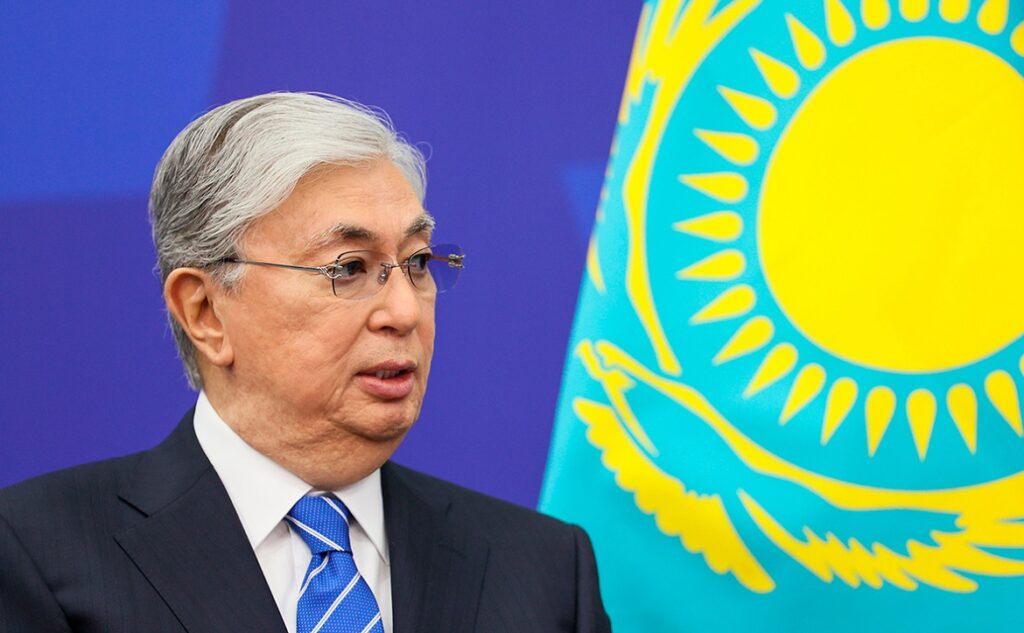World Geostrategic Insights interview with Alberto Frigerio on political and economic reforms in Kazakhstan, the changes and prospects of its relations with Russia, the sustainability of Kazakhstan’s ‘multi-carrier’ diplomacy, the influence of the West, and core of his book ‘Dystopian World’.

Alberto Frigerio is Professor of International Relations at Almaty Management University (AlmaU, Kazakhstan). He is the author of the book ‘Dystopian World‘ and several researches on international protection of cultural heritage, critical analysis of contemporary global challenges and implementation of sustainability principles. Alberto has conducted seminars and training activities in various countries around the world. He has also held leadership positions, including Dean of the AlmaU School of Politics and Law from 2020 to 2022. His background is in International Relations (BA and MA) and Cultural Heritage Management and Development (Ph.D.).
Q1 – Kazakhstan has undertaken a series of political and economic reforms aimed at transforming the country, with a strengthened power of parliament, a better distribution of wealth, and a greater role for the Kazakh People’s Assembly. Is there a turn toward democracy in Kazakhstan?
A1 – Since Tokayev was elected as President of Kazakhstan, the country has implemented some noteworthy reforms. The pilot program for direct election of akimats (majors) in select cities is, in my opinion, the most significant innovation that will ultimately end up in profound changes if implemented extensively. However, I am not yet persuaded that it is appropriate to talk about a democratic turn for a number of reasons.
First, Kazakhstan continues to be devoid of genuine and efficient multipartism, which is an absolute need for a democratic system.
Second, the nation’s adherence to the principles of transparency and accountability remains unsatisfactory. The new trajectory appears to be progressing in a positive direction. It nonetheless seems premature to exult.
Third, combating corruption occupies a central position on the Kazakh public agenda. However, certain practices remain firmly established in society as components of an uncodified system of norms. To overcome these challenges, Kazakhstan must fortify its legal framework both normatively and in terms of operational enforcement mechanisms.
Fourth, Kazakhstan boasts a vibrant civil society that actively advocates for human rights, encourages youth participation, and supports a sustainable green transition. However, the degree of collaboration and trust that exists between civil society organizations and public institutions is still maturing.
In conclusion, Kazakhstan is diligently constructing the groundwork for a liberal democratic system; nevertheless, much still needs to be done.
Q2 – In a region traditionally considered Russia’s sphere of influence, Kazakhstan’s commitment to maintaining Ukraine’s territorial integrity, its refusal to support the Russian invasion, and its compliance with Western sanctions against Russia are seen as evidence of its growing foreign policy independence, likewise Kazakhstan’s efforts to reduce Russia’s influence on its territory by diversifying its economy, energy, and defense. As a result, despite the close and historic relationship with Russia, some analysts believe that the decoupling between Russia and Kazakhstan is already an irreversible phenomenon. According to others, however, geography, economic and cultural ties matter, so Russia remains the most influential actor in Kazakhstan and its main partner and strategic ally. What is your opinion on the current state and prospects of relations between the two countries?
A2 – Kazakhstan’s foreign policy is based on an organizing principle known as “multi-vector policy”. The fundamental concept is that Kazakhstan should cultivate positive relations with other countries and actively seek opportunities for its advancement. Since gaining independence, Kazakhstan has consistently pursued this approach as the driving force behind its foreign policy. However, the enduring geographical, historical, and cultural ties could not be abruptly severed.
Indeed, Russia continued to be the primary political and commercial ally for a significant period. Currently, Russia is still a strategic partner of Kazakhstan. But something has changed. Kazakhstan has recently reaffirmed its multi-vector policy by positioning itself as a bridge between the East and West, as well as between the North and South of the world. As a result, on various occasions, countries have been invited to Astana to discuss hot themes such as conflict resolution in Syria or nuclear disarmament.
In other terms, Kazakhstan is presently eager to assume the role of an active mediator in the global arena. However, this requires a degree of operational flexibility that is difficult to attain through the maintenance of a tight relationship with Russia. So, a balance of the interests at stake needs to be achieved.
Let’s consider the war in Ukraine. President Tokayev has made it clear that the occupied areas will not be recognized as Russian territories in virtue of the territorial integrity principle. However, he has never directly condemned Russian military intervention and the country officially maintains a neutral position over the conflict. This can be easily verified by examining Kazakhstan’s voting patterns in UN resolutions and reading the speeches made by the Kazakh president from the start of the war until now.
Therefore, it is likely that Russia will maintain its status as a substantial partner of Kazakhstan. However, this will occur within a broader multi-vector framework, wherein the European Union and China will progressively augment their influence in the country, and Kazakhstan will position itself as a valuable mediator in the context of global crises.
Q3 – In your opinion, is Kazakhstan’s “multi-carrier” diplomacy, which seeks to balance its relations with different global powers, without aligning itself with any bloc or alliance, sustainable at a time of strong political confrontation between the West, Russia and China?
A3 – This is an extremely interesting question. A year ago, I wrote an article titled “Kazakhstan in the 21st Century Multiverse: Six Challenges to Define Its Future Course.” In such an article, I stated that this issue will represent one of Kazakhstan’s central dilemmas of this century. The prevailing viewpoint among Kazakh policy-makers is that this approach is not only functional but also unavoidable. Sitting amidst numerous centers of power, Kazakhstan’s setting necessitates a multifaceted approach to foreign policy. However, I am uncertain about how far such a policy can be sustained within a system of international blocs.
One could argue that, notwithstanding the escalating tensions between Western countries and Russia, the prospect of such an extreme scenario is still to come. And I agree with that. At the global level, however, many instances indicate an intensifying polarization of the positions at stake. So, the risk of a more polarized world is concrete. At present, a multi-vector policy seems still the most feasible and desirable approach for Kazakhstan. Will it be a truly viable option in the event that the system of international relations continues to deteriorate? I am not sure. One day, Kazakhstan could find itself in a dire situation where a critical decision ought to be made.
Q4 – The EU and the United States are the largest investors in Kazakhstan, but, according to some analysts, the West’s influence is waning as President Tokayev looks to other partners, such as China, to provide unconditional and often informal funding mechanisms. What is your opinion?
A4 – I am not entirely in agreement with the assertion that the West’s influence is waning in Kazakhstan. Undeniably, commercial ties with China have reached unprecedented levels. As proof of this highly dynamic relationship, last year Tokayev attended the inaugural China-Central Asian summit in Xi’an on May 18th, instead of participating in the 2nd economic forum UE-Central Asia which commenced in Almaty on the same day.
Nevertheless, relations with Western countries are also on the rise. Biden’s September 2023 meeting with five leaders from Central Asia, Borrel and Macron’s November 2023 visit to Kazakhstan, and Tokayev’s January 2024 visit to Rome are all indicators of the valuable relations existing between Kazakhstan and the West. Thus, China is the main trading partner and Russia is the historical ally of Kazakhstan.
But, at the same time, the European Union and its member states (e.g., the Netherlands, Germany, Italy, and France) are crucial trade and investment partners operating in critical sectors such as agricultural production, medical industry, and renewable energy. Likewise, the United States is a major player in both the fossil fuel industry and ICT technologies. Therefore, Kazakhstan will most plausibly continue to make every effort to foster constructive relations with each of these actors as part of its foreign policy strategy.
Q5 – You are the author of the book “Dystopian World“, which aims to raise the public’s attention to a number of contemporary global challenges-such as climate change, lack of vital resources, overpopulation, global pandemics, social inequality, authoritarianism, weapons of mass destruction, artificial intelligence and genetic engineering-by provocatively arguing that the world may soon turn into a dystopia. Can you give us some more details about your thinking on the subject?
A5 – At the core, my book “Dystopian World” (2019) emphasizes the importance of scientific research and constructive dialogue to prevent worst-case scenarios. Sadly, human nature compels us to respond to tragedies rather than proactively averting them. However, such a strategy is ridiculously expensive and risky. For example, when my book was published in November 2019, it documented a variety of studies that asserted a noteworthy likelihood of a worldwide pandemic. The world discovered Covid-19 one month later. The point is that diverse studies had already identified certain tangible risks before the pandemic started, but they were underestimated and/or ignored.
Today the situation is the same. For example, we are just beginning to delve deeper into the role of artificial intelligence: a few days ago, for instance, US officials urged China and Russia to ensure that nuclear weapons would be under the sole control of humans and not AI. But this topic was already addressed in academia more than five years ago. So, the weird aspect is that we are either already inhabiting a dystopian-type scenario (for example, considering data about the socioeconomic divide among individuals worldwide) or are on the verge of entering one (as in the case of climate change), but we do not recognize that due to ignorance.
Indeed, our incapability to undertake necessary actions is, first of all, hindered by a lack of awareness and comprehension. Hence, it is vital to elevate public awareness by not only incorporating the latest scientific findings but also ensuring they are presented clearly and understandably for everyone. If we can accomplish this in a way that is appealing and agreeable to the majority, it would have an even greater impact.
Alberto Frigerio – Professor of International Relations at Almaty Management University (AlmaU, Kazakhstan).







